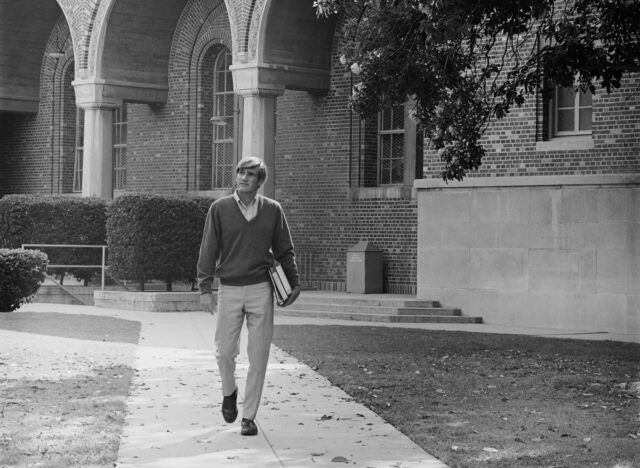
Long-ago Federal Benefit for Boomers in College Paid Off
In the late 1960s and 1970s, the U.S. Social Security Administration subsidized college expenses for young adults with deceased, disabled or retired parents who were receiving dependent benefits. The other requirements were that they were full-time students and remained single while they were in school.
The baby boomers who participated in that program, which ended decades ago, have retired or are about to. With more than 40 years of work under their belts, RAND researchers looked back over their careers to see whether the financial support for pursuing a degree had a material effect on their lives.
And they found that it did. The boomers in the study with a deceased father who were eligible for the student benefit earned more over their working lives than did the students whose father had died after the subsidy ended.
The total subsidy received by a student in the early 1970s was substantial – the equivalent of about $32,000 today. Although Congress curtailed the program in 1981, this research might have some relevance to the current policy debate over whether college loans should be forgiven or governments could do more to make college affordable and more widely available.
The subsidy for college-age dependents was, for its brief life, a continuation of the standard Social Security benefit, still in existence today, for children and teenagers under 18 whose parent had died. The data in this research covered boomers who had lost a father, usually the family breadwinners in the 1960s and 1970s.
The increase in earnings among people who received the student subsidy was concentrated in two groups: women and the oldest sibling in the family.
The women who had received the extra years of financial support in college earned more during their careers because they were, by attending college, setting themselves apart from most women who, at that time, went to college at lower rates than men. College-bound women were essentially signaling to employers that they were determined to develop a career and delay marriage and probably motherhood. And they gained valuable human capital in college that the labor market rewards.
College attendance conveyed their “future commitment to the labor market, capability of finishing things, and perseverance,” the study concluded.
A second group that earned significantly more were the oldest siblings. One possible explanation is that the teenagers felt pressured to earn money to support mothers who were housewives or had only a part-time job that didn’t pay well. The subsidy might’ve relieved some of that financial pressure. If they went to college, at least they wouldn’t be sinking more of the family’s resources into tuition.
The higher lifetime earnings for program participants were also concentrated among people who completed only two years of college – in other words, people “who might not have attended any college if not for receiving the student benefit,” the researchers explained.
Social Security’s financial support for college students was, they concluded, a human capital investment that ultimately improved their economic prospects.
To read this study by Kathryn Anne Edwards, Daniel Schwam, and Melanie Zaber, see “The Effect of the Social Security Student Benefit on Lifetime Earnings.”
The research reported herein was derived in whole or in part from research activities performed pursuant to a grant from the U.S. Social Security Administration (SSA) funded as part of the Retirement and Disability Research Consortium. The opinions and conclusions expressed are solely those of the authors and do not represent the opinions or policy of SSA, any agency of the federal government, or Boston College. Neither the United States Government nor any agency thereof, nor any of their employees, make any warranty, express or implied, or assumes any legal liability or responsibility for the accuracy, completeness, or usefulness of the contents of this report. Reference herein to any specific commercial product, process or service by trade name, trademark, manufacturer, or otherwise does not necessarily constitute or imply endorsement, recommendation or favoring by the United States Government or any agency thereof.
Comments are closed.







Thanks for the memory, as it happens. I had a friend in college fifty years ago, my mentor really, who had this benefit because his mother had died when he was young. I don’t know how he did subsequently, but I do know that his having been in college then was quite important to me.